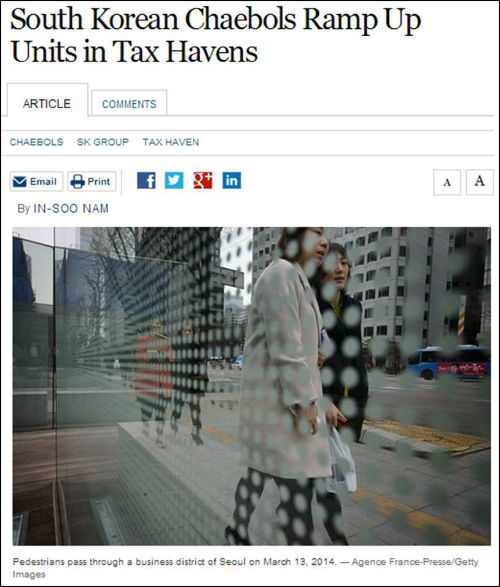SK, 10개 조세피난처에 24개 새 법인 신설
세계적 경제전문지 월스트리트저널(이하 WSJ)이 한국 재벌들의 조세피난처 법인 설립이 1년 새 60%까지 급격하게 증가한 것으로 나타났다고 보도했다.
WSJ는 “South Korean Chaebols Ramp Up Units in Tax Havens-한국 재벌그룹, 조세피난처에 법인 설립 증가”라는 제목의 기사를 통해 “대한민국의 마냥 커져가는 대기업들이 조세피난처에 모습을 나타내는 일이 지난해 급격히 증가했으며 선두주자로서 한국에서 세 번째로 큰 기업인 SK그룹이 있다”고 전했다. (☞ ‘WSJ’ 원문 기사 보러가기)

WSJ는 “조세피난처들은 세금이 아예 없거나 세율이 낮고 재정 서류를 공개하는 투명함이 없다는 이유로 전 세계적으로 기업들에게 인기가 높다”면서, “하지만 지난해 한국의 가장 큰 가족경영체제의 대기업인 재벌그룹 40개 회사가 설립한 조세피난처 법인의 수가 60%나 늘어났고, 이는 2012년 이러한 재벌 법인이 14% 감소했던 것과 비교된다”는 재벌닷컴의 발표 보고서를 인용했다.
WSJ는 또한 “삼성전자와 현대자동차를 비롯한 한국 기업의 임원들은 이전 정부에서 화이트 칼라형 범죄로 일찍이 유죄 판결을 받았다”며 “대기업들에게 지나치게 친밀했던 것으로 널리 알려진 이명박 전임대통령 정부 동안 재벌들의 불투명한 사업 운용에 대한 대중의 분노가 심화됐었다”고 지적하기도 했다.
한편, 재벌닷컴에 따르면 SK그룹은 조사대상 10개 조세피난처 지역에 35개사 법인을 둔 것으로 나타나 가장 많았고, 롯데그룹이 13개사로 그 뒤를 이었다.
특히 세계 다국적기업들의 페이퍼컨퍼니가 대거 운집해 있는 것으로 알려진 케이만군도에 있는 법인이 1년만에 배 이상으로 폭증한 것으로 나타나 눈길을 끈다.
이는 지난해 국제탐사보도언론인협회(ICIJ) 등이 버진 아일랜드 소재 법인에 대한 명단 및 실체 집중 폭로 이후 상대적으로 덜 알려진 케이군만도로 몰린 것으로 분석된다.
| 다음은 ‘뉴스프로’가 번역한 WSJ 기사 번역 전문. South Korean Chaebols Ramp Up Units in Tax Havens 1:53 pm KST, Jun 10, 2014, By IN-SOO NAM South Korea’s sprawling conglomerates sharply increased their presence in tax havens last year, with the country’s third-largest business group, SK Group, leading the pack. Tax havens are popular among businesses globally for their zero or low tax rates and, in some cases, the lack of transparency in making financial data public. But last year, there was a 60% jump in the number of tax haven units set up by 40 of Korea’s largest family-run conglomerates, known as chaebols, research firm Chaebul.com says in a report. That compares with a 14% decline in the number of such chaebol units in 2012. “Establishing paper companies in a tax haven isn’t illegal in itself. But given that some Korean conglomerates have taken advantage of it to evade taxes and make inappropriate financial transactions to create slush funds, the tax authorities need to pay close attention to the rise in their numbers,” said Chung Sun-sup, chief executive of the research firm that tracks the assets of chaebols and their owners. The leaders of several well-known Korean businesses, including Samsung Electronics Co. and Hyundai Motor Co., have earlier been found guilty of white-collar crimes in previous administrations. Public anger over the opaque business practices at chaebols intensified during the administration of former president Lee Myung-bak, who was widely perceived as being too cosy with big businesses. Last year, the conglomerates had a combined 86 affiliates in the Cayman Islands and nine other tax havens, up from 54 a year earlier. The sharp rise was mostly due to SK Group, which set up 24 new units across the 10 tax havens last year. SK Group, which operates businesses in areas such as energy resources development, telecommunications, shipping and construction, topped the list, followed by Daelim Group, which had four new subsidiaries. Changes at the other conglomerates were negligible, with an increase of just one or two, the report says. An official at the National Tax Service said the tax authority is closely watching such increases, but it usually doesn’t launch a probe unless there is a hint of wrongdoing. The Bank of Korea and financial regulators are currently looking into alleged violations of a foreign-exchange law involving conglomerate executives, after a civic group last year disclosed the names of nearly 20 Koreans suspected of having evaded taxes by creating paper companies in the British Virgin Islands, Singapore and other nations. As part of her campaign pledges against wrongdoing at conglomerates, South Korean President Park Geun-hye, who took office in February last year, said she would deal sternly with white-collar crime. Chaebul.com varies the 40 business groups it scrutinizes each year based on the size of their year-end assets, but there have only been minor changes in the group in recent years, it said. An SK Group spokesman said the number of its overseas affiliates in the territories mentioned by the research firm increased to 33 last year from 12 in 2012, lower than Chaebul.com’s total tally of 35 units. The discrepancy might have occurred because Chaebul.com counted some shipping companies with no capital, he says. Chaebul.com says it didn’t include companies without capital in its tally. “Last year, we were active with overseas infrastructure and resources funds, which naturally required the setup of joint ventures and management firms. We incorporated the firms in the so-called tax havens for the ease of the establishment. We have reported all transactions and profits from them to Korea’s tax authorities, so there was nothing illegal or wrong with the overseas units,” said the spokesman. |


